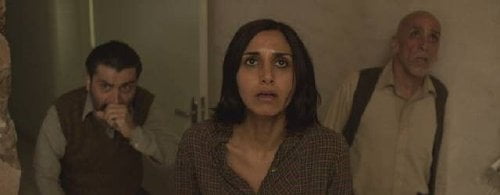Under the Shadow

Shideh (Narges Rashidi) is at loose ends after her appeal to return to medical school is shut down for the last time because of her political activism years earlier. She rages when her doctor husband Iraj (Bobby Naderi, "Argo") suggests it may be 'for the best.' When he's drafted to serve in the ongoing Iran-Iraq War, Shideh refuses to take their daughter, Dorsa (Avin Manshadi), to his parents, preferring to stay in their small Tehran apartment building. But when a missile crashes through the roof, bringing about the mysterious death of Mr. Bijari (Nabil Koni), Dorsa begins to act strangely, talking to a woman her mother cannot see in "Under the Shadow."
Laura's Review: B+
Horror is the toughest genre to get right, so it's always a thrill when one comes along that not only serves up chills, but has something on its mind as well. If the recent Polish horror outing, "Demon," was really about WWII history coming back to haunt the denizens of a rural town, "Under the Shadow" is a political metaphor for Iran's subjugation of women. Writer/director Babak Anvari has used his own experiences to craft a powerful feminist message and introduce Western audiences to the Djinn, an Islamic spirit riding the winds, searching for a human to possess. ("Under the Shadow" is Great Britain's submission for the 2016-2017 Foreign Language Oscar.) Although his first scene is set in a university office, where Shideh sits in full hijab, Anvari immediately begins to unsettle, a bomb shattering the cityscape seen outside a window. Back at home, we see Shideh for the more rebellious woman she is. She immediately removes her hijab and works out to a Jane Fonda tape on her forbidden VCR. There is clearly tension between herself and her husband. Their windows are all taped X's, a precautionary measure, but also a mark. Sound design incorporates a low rumble which increasingly sounds like a howling wind. Dorsa claims to hear someone walking around at night in their apartment, but Iraj assures her she was dreaming. After he leaves, another sound horrifies, that of the frequent air raid sirens, and Shideh brings Dorsa down to the basement where the little girl is handed something by the landlord's strange nephew, Mehdi. She later tells her mother it was a ball of cat fur for protection against Djinn. Shideh asks Mrs. Ebrahimi (Aram Ghasemy) to keep the boy from scaring her daughter, but the landlord's wife tells her that Djinn are real and if they take a treasured belonging they can possess you. And that Mehdi is mute, not having spoken since witnessing his parents' death. When the siren sounds the next time, Shideh is pulled in every direction, trying to keep her daughter close, but also being called to the top floor where Mr. Bijari lies dying beneath the unexploded missile protruding through the roof. She tries to revive him but cannot. Dorsa becomes obsessed with finding Kimie, the doll she left on her bed that is no longer there. As her neighbors begin to join the exodus from Tehran, Shideh increasingly begins to lose her sense of reality, dreams slamming into real life horrors. In her quest fo find her daughter's doll, she finds her prized workout tape unspooled in the kitchen bin. Then she sees the hijab wrapped woman Dorsa has been speaking to and flees in a panic into the street. Two policemen take her to the station for her improper dress instead of responding to her distress. Back home, as the Djinn becomes more menacing, she makes the decision to leave, but the garage door bolt Mr. Ebrahimi (Ray Haratian, "A Girl Walks Home Alone at Night") had accused her of never properly closing refuses to budge. Cinematographer Kit Fraser has a great eye for composition, subtly drawing our eye to certain points in the frame or creating a sense of claustrophobia. When Shideh's picture of her mother falls during an attack, the glass breaks in the same pattern as the tape on her windows. A simple trick with billowing fabric is not only horrific, but echoes the tarp on the building's roof used to cover the gaping hole left by the missile. Shideh's isolation, her domination by men and responsibility for her child during a time of war recall the Afghani film "The Patience Stone," but that film used a cultural legend as a stepping stone to freedom. Anvari's spirit is an oppressive one and he leaves his mother and daughter in its grasp. "Under the Shadow" uses the horror genre to express the crippling effect of humankind's own every day evils. Grade:

